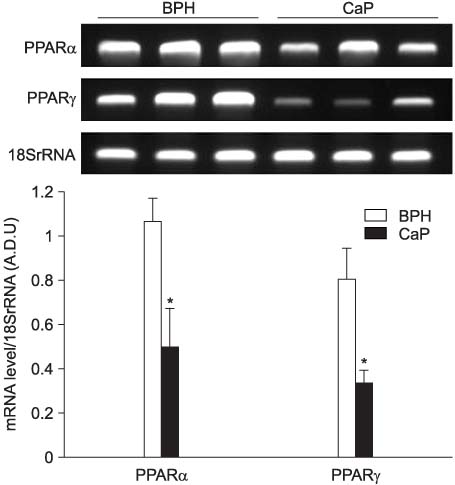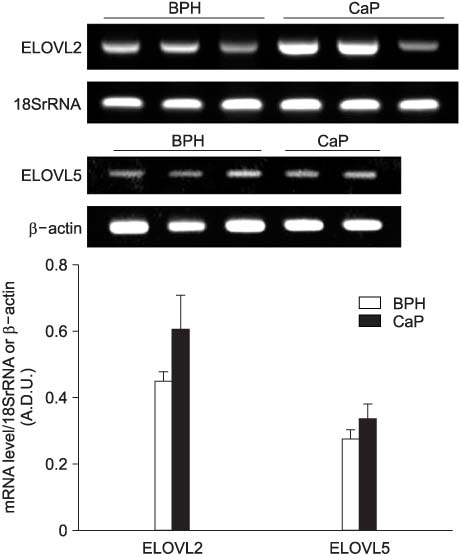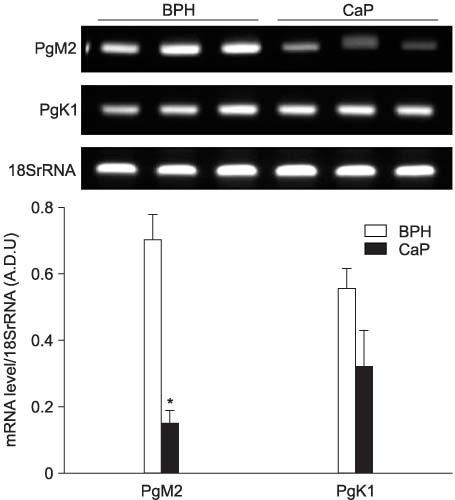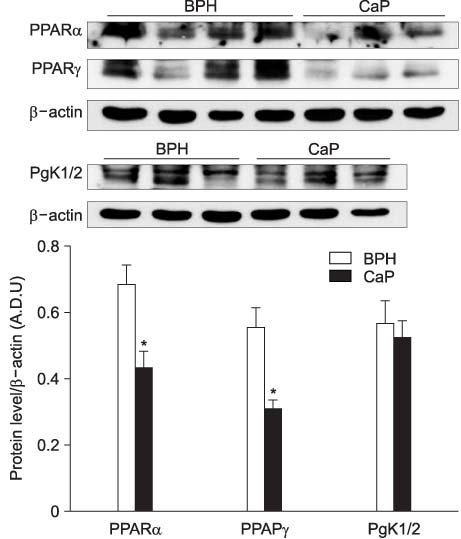Korean J Urol.
2006 Jun;47(6):661-666. 10.4111/kju.2006.47.6.661.
Downregulation of Peroxisome Proliferator-Activated Receptor (PPAR)alpha, PPARgamma, and Phosphoglycerate Mutase 2 in Prostate Cancer
- Affiliations
-
- 1Department of Urology, Catholic University of Daegu School of Medicine, Daegu, Korea. dykim@mail.cu.ac.kr
- 2Department of Physiology, Kyungpook National University School of Medicine, Daegu, Korea.
- 3Department of Urology, Eulji University School of Medicine, Seoul, Korea.
- KMID: 2294244
- DOI: http://doi.org/10.4111/kju.2006.47.6.661
Abstract
-
PURPOSE: To evaluate whether factors related to lipid and glucose metabolism have a potential role in the progression of prostate cancer, we measured the mRNA levels of the peroxisome proliferator-activated receptor (PPAR), fatty acid elongase (ELOVL), and two glycolytic enzymes in prostate cancer (CaP) tissues.
MATERIALS AND METHODS
Prostate tissues, obtained from radical prostatectomy (n=10) and transurethral resection of prostate (n=18), were quickly frozen in liquid nitrogen for RNA measurements. Transcript signals of PPAR alpha, PPAR gamma, ELOVL2, ELOVL5, phosphoglycerate kinase 1 (PgK1) and phosphoglycerate mutase 2 (PgM2) were measured using a reverse-transcription polymerase chain reaction.
RESULTS
The transcript signals of PPAR alpha and PPAR gamma were down-regulated in CaP tissues. In addition, the mRNA level of PgM2 in CaP tissues was lower than that in benign prostatic hyperplasia (BPH) tissues. However, the messages for ELOVL2, ELOVL5, and PgK1 were not significantly changed.
CONCLUSIONS
These results suggest that lowering of the PPARalpha, PPARgamma and PgM2 messages may be involved in aberrant and uncontrolled prostate cell growth and differentiation.
MeSH Terms
-
Down-Regulation*
Glucose
Metabolism
Nitrogen
Peroxisome Proliferator-Activated Receptors
Peroxisomes*
Phosphoglycerate Kinase
Phosphoglycerate Mutase*
Polymerase Chain Reaction
PPAR alpha
PPAR gamma*
Prostate*
Prostatectomy
Prostatic Hyperplasia
Prostatic Neoplasms*
RNA
RNA, Messenger
Transurethral Resection of Prostate
Glucose
Nitrogen
PPAR alpha
PPAR gamma
Peroxisome Proliferator-Activated Receptors
Phosphoglycerate Kinase
Phosphoglycerate Mutase
RNA
RNA, Messenger
Figure
Reference
-
1. Gleave M, Miyake H, Chi K. Beyond simple castration: targeting the molecular basis of treatment resistance in advanced prostate cancer. Cancer Chemother Pharmacol. 2005. 56:Suppl 1. 47–57.2. Pienta KJ, Smith DC. Advances in prostate cancer chemotherapy: a new era begins. CA Cancer J Clin. 2005. 55:300–318.3. Freeman VL, Meydani M, Hur K, Flanigan RC. Inverse association between prostatic polyunsaturated fatty acid and risk of locally advanced prostate carcinoma. Cancer. 2004. 101:2744–2754.4. Augustsson K, Michaud DS, Rimm EB, Leitzmann MF, Stampfer MJ, Willett WC, et al. A prospective study of intake of fish and marine fatty acids and prostate cancer. Cancer Epidemiol Biomarkers Prev. 2003. 12:64–67.5. Mamalakis G, Kafatos A, Kalogeropoulos N, Andrikopoulos N, Daskalopoulos G, Kranidis A. Prostate cancer vs hyperplasia: relationships with prostatic and adipose tissue fatty acid composition. Prostaglandins Leukot Essent Fatty Acids. 2002. 66:467–477.6. Yang YJ, Lee SH, Hong SJ, Chung BC. Comparison of fatty acid profiles in the serum of patients with prostate cancer and benign prostatic hyperplasia. Clin Biochem. 1999. 32:405–409.7. Terry PD, Rohan TE, Wolk A. Intakes of fish and marine fatty acids and the risks of cancers of the breast and prostate and of other hormone-related cancers: a review of the epidemiologic evidence. Am J Clin Nutr. 2003. 77:532–543.8. Schoonjans K, Staels B, Auwerx J. Role of the peroxisome proliferator-activated receptor (PPAR) in mediating the effects of fibrates and fatty acids on gene expression. J Lipid Res. 1996. 37:907–925.9. Green S, Wahli W. Peroxisome proliferator-activated receptors: finding the orphan a home. Mol Cell Endocrinol. 1994. 100:149–153.10. Dreyer C, Krey G, Keller H, Givel F, Helftenbein G, Wahli W. Control of the peroxisomal beta-oxidation pathway by a novel family of nuclear hormone receptors. Cell. 1992. 68:879–887.11. Kliewer SA, Sundseth SS, Jones SA, Brown PJ, Wisely GB, Koble CS, et al. Fatty acids and eicosanoids regulate gene expression through direct interactions with peroxisome proliferator-activated receptors alpha and gamma. Proc Natl Acad Sci USA. 1997. 94:4318–4323.12. Pawar A, Xu J, Jerks E, Mangelsdorf DJ, Jump DB. Fatty acid regulation of liver X receptors (LXR) and peroxisome proliferator-activated receptor alpha (PPARalpha) in HEK293 cells. J Biol Chem. 2002. 277:39243–39250.13. Wang Y, Botolin D, Christian B, Busik J, Xu J, Jump DB. Tissue-specific, nutritional, and developmental regulation of rat fatty acid elongases. J Lipid Res. 2005. 46:706–715.14. Horton JD, Shah NA, Warrington JA, Anderson NN, Park SW, Brown MS, et al. Combined analysis of oligonucleotide microarray data from transgenic and knockout mice identifies direct SREBP target genes. Proc Natl Acad Sci USA. 2003. 100:12027–12032.15. Narayanan NK, Narayanan BA, Nixon DW. Resveratrol-induced cell growth inhibition and apoptosis is associated with modulation of phosphoglycerate mutase B in human prostate cancer cells: two-dimensional sodium dodecyl sulfate-polyacrylamide gel electrophoresis and mass spectrometry evaluation. Cancer Detect Prev. 2004. 28:443–452.16. Rose A, Xu Y, Chen Z, Fan Z, Stamey TA, McNeal JE, et al. Comparative gene and protein expression in primary cultures of epithelial cells from benign prostatic hyperplasia and prostate cancer. Cancer Lett. 2005. 227:213–232.17. Jiang M, Shappell SB, Hayward SW. Approaches to understanding the importance and clinical implications of peroxisome proliferator-activated receptor gamma (PPARgamma) signaling in prostate cancer. J Cell Biochem. 2004. 91:513–527.18. van Baren MJ, Heutink P. The PCR suite. Bioinformatics. 2004. 20:591–593.19. Nwankwo JO, Robbins ME. Peroxisome proliferator-activated receptor-gamma expression in human malignant and normal brain, breast and prostate-derived cells. Prostaglandins Leukot Essent Fatty Acids. 2001. 64:241–245.20. Segawa Y, Yoshimura R, Hase T, Nakatani T, Wada S, Kawahito Y, et al. Expression of peroxisome proliferator-activated receptor (PPAR) in human prostate cancer. Prostate. 2002. 51:108–116.21. Mueller E, Smith M, Sarraf P, Kroll T, Aiyer A, Kaufman DS, et al. Effects of ligand activation of peroxisome proliferator-activated receptor gamma in human prostate cancer. Proc Natl Acad Sci USA. 2000. 97:10990–10995.22. Smith MR, Manola J, Kaufman DS, George D, Oh WK, Mueller E, et al. Rosiglitazone versus placebo for men with prostate carcinoma and a rising serum prostate-specific antigen level after radical prostatectomy and/or radiation therapy. Cancer. 2004. 101:1569–1574.23. Strother JM, Beer TM, Dreicer R. Novel cytotoxic and biological agents for prostate cancer: where will the money be in 2005? Eur J Cancer. 2005. 41:954–964.24. Collett GP, Betts AM, Johnson MI, Pulimood AB, Cook S, Neal DE, et al. Peroxisome proliferator-activated receptor alpha is an androgen-responsive gene in human prostate and is highly expressed in prostatic adenocarcinoma. Clin Cancer Res. 2000. 6:3241–3248.25. Lay AJ, Jiang XM, Kisker O, Flynn E, Underwood A, Condron R, et al. Phosphoglycerate kinase acts in tumour angiogenesis as a disulphide reductase. Nature. 2000. 408:869–873.26. Stamey TA, Warrington JA, Caldwell MC, Chen Z, Fan Z, Mahadevappa M, et al. Molecular genetic profiling of Gleason grade 4/5 prostate cancers compared to benign prostatic hyperplasia. J Urol. 2001. 166:2171–2177.
- Full Text Links
- Actions
-
Cited
- CITED
-
- Close
- Share
- Similar articles
-
- Refocusing Peroxisome Proliferator Activated Receptor-alpha: A New Insight for Therapeutic Roles in Diabetes
- Peroxisome Proliferator Activated Receptor-delta (PPAR-delta)
- Effects of Sulfonylureas on Peroxisome Proliferator-Activated Receptor gamma Activity and on Glucose Uptake by Thiazolidinediones
- Safety and Efficacy of Peroxisome Proliferator-Activated Receptor-alpha Agonist for Treating Cardiovascular Disease
- Change of peroxisome proliferator-activated receptor gamma expression pattern in the gerbil dentate gyrus after transient global cerebral ischemia





